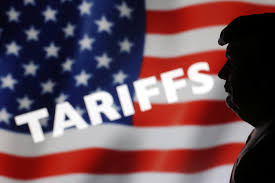
In a bold move that has sent shockwaves through the international community, U.S. President Donald Trump announced a sweeping set of tariffs aimed at rebalancing global trade dynamics. The new policy imposes a baseline 10% tariff on all imports into the United States, with significantly higher rates targeting specific countries: 34% on China, 20% on the European Union, 24% on Japan, and 25% on South Korea. This aggressive stance has ignited fears of a global trade war, with potential ramifications for economic growth, inflation, and international relations.
President Trump's tariff strategy marks a decisive pivot from the post-World War II era of globalization and free trade that the United States once championed. By implementing these tariffs, the administration aims to protect domestic industries, reduce trade deficits, and encourage multinational corporations to repatriate manufacturing operations. However, this protectionist approach has raised concerns about the potential dismantling of the global free trade order.
Global Response and Potential Retaliation
The international reaction to the U.S. tariffs has been swift and critical. The European Union has condemned the measures as a "major blow to the world economy" and is considering countermeasures to protect its economic interests. China, facing a substantial 34% tariff, has vowed to implement reciprocal tariffs on U.S. goods, escalating fears of a tit-for-tat trade war. Other affected nations, including Japan and South Korea, have expressed dismay and are exploring avenues for negotiation and potential retaliation.
Economists warn that the imposition of such tariffs could lead to increased consumer prices, contributing to inflationary pressures. The additional costs imposed on imported goods are likely to be passed on to consumers, reducing purchasing power and potentially dampening economic growth. Furthermore, the uncertainty surrounding international trade relations may lead to decreased investment and disruptions in global supply chains, exacerbating economic instability.
Financial markets have reacted negatively to the announcement of the tariffs. Major stock indices experienced significant declines as investors moved towards safer assets such as bonds and gold. The heightened uncertainty has led to increased market volatility, reflecting concerns about the broader economic impact of escalating trade tensions.
The tariffs are expected to have varied impacts across different sectors and regions. Industries heavily reliant on international supply chains, such as automotive and technology, may face increased production costs and disruptions. Countries with economies closely tied to U.S. trade, particularly in Asia and Europe, may experience economic slowdowns as a result of decreased exports and potential retaliatory measures.
Historically, the implementation of protectionist trade policies has led to strained international relations and economic downturns. The current trajectory raises concerns about a repeat of such scenarios, with the potential for a full-scale global trade war. The future outlook remains uncertain, contingent on the responses of affected nations and the possibility of negotiated settlements to de-escalate tensions.
President Trump's tariff strategy represents a significant shift in U.S. trade policy, with far-reaching implications for the global economy. While intended to bolster domestic industries and correct trade imbalances, the approach risks triggering retaliatory measures, increasing consumer prices, and slowing economic growth. The international community now faces the challenge of navigating these turbulent waters, seeking to balance national interests with the overarching goal of maintaining a stable and cooperative global trade environment.
(Source:www.theinsurer.com)
President Trump's tariff strategy marks a decisive pivot from the post-World War II era of globalization and free trade that the United States once championed. By implementing these tariffs, the administration aims to protect domestic industries, reduce trade deficits, and encourage multinational corporations to repatriate manufacturing operations. However, this protectionist approach has raised concerns about the potential dismantling of the global free trade order.
Global Response and Potential Retaliation
The international reaction to the U.S. tariffs has been swift and critical. The European Union has condemned the measures as a "major blow to the world economy" and is considering countermeasures to protect its economic interests. China, facing a substantial 34% tariff, has vowed to implement reciprocal tariffs on U.S. goods, escalating fears of a tit-for-tat trade war. Other affected nations, including Japan and South Korea, have expressed dismay and are exploring avenues for negotiation and potential retaliation.
Economists warn that the imposition of such tariffs could lead to increased consumer prices, contributing to inflationary pressures. The additional costs imposed on imported goods are likely to be passed on to consumers, reducing purchasing power and potentially dampening economic growth. Furthermore, the uncertainty surrounding international trade relations may lead to decreased investment and disruptions in global supply chains, exacerbating economic instability.
Financial markets have reacted negatively to the announcement of the tariffs. Major stock indices experienced significant declines as investors moved towards safer assets such as bonds and gold. The heightened uncertainty has led to increased market volatility, reflecting concerns about the broader economic impact of escalating trade tensions.
The tariffs are expected to have varied impacts across different sectors and regions. Industries heavily reliant on international supply chains, such as automotive and technology, may face increased production costs and disruptions. Countries with economies closely tied to U.S. trade, particularly in Asia and Europe, may experience economic slowdowns as a result of decreased exports and potential retaliatory measures.
Historically, the implementation of protectionist trade policies has led to strained international relations and economic downturns. The current trajectory raises concerns about a repeat of such scenarios, with the potential for a full-scale global trade war. The future outlook remains uncertain, contingent on the responses of affected nations and the possibility of negotiated settlements to de-escalate tensions.
President Trump's tariff strategy represents a significant shift in U.S. trade policy, with far-reaching implications for the global economy. While intended to bolster domestic industries and correct trade imbalances, the approach risks triggering retaliatory measures, increasing consumer prices, and slowing economic growth. The international community now faces the challenge of navigating these turbulent waters, seeking to balance national interests with the overarching goal of maintaining a stable and cooperative global trade environment.
(Source:www.theinsurer.com)














